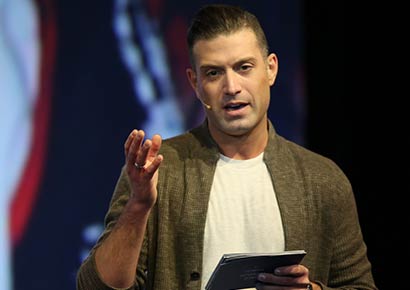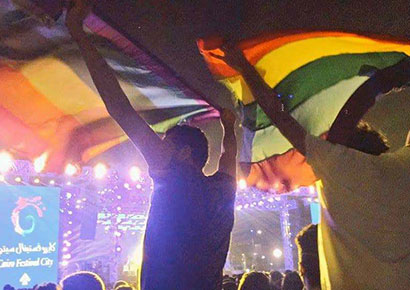Opinion: Omar Sharif Jr on Egypt’s brutal LGBTQ crackdown

Pic: Oslo Freedom Forum
Omar Sharif Jr, the grandson of film star Omar Sharif, is an Egyptian actor, model, and LGBTQ rights activist. Here he writes about the heartbreak and terror faced by his country’s LGBTQ community as they are targeted by the State.
Every morning I wake up to an inbox flooded with disturbing and disheartening messages out of Egypt.
The messages come from friends and strangers alike, members of the gay Egyptian community I left behind five years ago when I came out as gay and withdrew from the country, hounded by threats of violence, intimidation and even death.
The authors of these messages are desperate to do what I did: escape a country gripped by an outbreak of homophobic persecution. Failing that, far too many of the writers say, they want to escape their lives. I do not know what to tell them. I would like to offer them hope. I would like it not to be false hope.
When I came out in 2012, I wanted to use my status as a relatively public figure — grandson of two of Egypt’s most beloved celebrities — to push LGBTQ acceptance through, what I then assumed would be, our darkest hour. Unfortunately, since then conditions have only worsened, and the country is now gripped by a brutal crackdown against some of its most vulnerable citizens.
In recent months, Egyptian police have begun stopping men they suspect of being gay on the street, searching their phones for incriminating photos or hook-up apps, and throwing them in prison for sentences ranging from six months to six years. There have been raids on bathhouses and at least one same-sex wedding. There are stomach-churning reports that police have subjected suspects to forcible anal exams, which are — let us not mince words here — a particularly humiliating form of torture.
We are the ‘perfect, faceless villains
The supposed impetus for this crackdown was a widely circulated video from a September concert in Cairo, during which some attendees waved rainbow flags in support of the band’s gay singer. The images spurred a wave of hateful rhetoric from Egyptian cultural commentators, who claimed these debauched radicals (as gay Egyptian people are imagined to be) represented a slap in the face to our country’s identity and goals.
These hateful messages found fertile ground in a country that is rightfully frustrated by the slow and painful pace of progress. As many frustrated societies have found, gay Egyptian people make for a convenient scapegoat. When we are already forced to live in the shadows, we are the perfect, faceless villains. In photographs of the men dragged into Egyptian jails, they all cover their faces with their shirts or their hands, hiding their shame and leaving observers to imagine that these men could be anyone (anyone except their friends and brothers and sons).

I don’t talk about this with my American friends. They hear these stories with the horror you’d expect, but I can’t help suspecting that it’s laced with some faint admonishment, and behind their pity I hear: “Well, what did you expect, having the foolishness to be born a gay Egyptian?”
They don’t know the fundamental warmth and joy I associate with the Egyptian people. They don’t understand the fierce patriotism and pride I feel for my country, a pride that exists for most LGBTQ Egyptians, despite their persecution. Though the country’s conservative talking heads paint the gay Egyptian community as treacherous radicals, our goals are the same as the government’s: security, stability and economic prosperity. (Prosperity, it bears mentioning, is harmed when Western tourists associate the country with human rights abuses and choose not to visit.)
The LGBTQ community is not even anti-Islam: it is a false dichotomy too often perpetuated that divides religion and LGBTQ acceptance. In 2016, Egypt’s grand mufti, Shawki Allam, unequivocally stated that no one has the right to hurt or harm homosexuals. Yet despite the words of one of the highest religious authorities in the country, religion continues to provide a convenient cover, allowing the people who trap us, beat us and torture us to imagine that they have morality on their side.
It’s difficult to explain to people who came of age during the heady wave of victories for the American LGBTQ movement that our goals in Egypt are much more modest. For the most part, we want only to live in the same quiet we have for generations, free from the terror that the smallest gesture or glance will betray us.
There is nothing radical about what I am
I can’t tell the young gay Egyptians who message me to come out en masse; I don’t want them to be cannon fodder for my ideals. I can’t even tell them to come out to their own families; few of them had the liberalising experiences my grandparents did, working on movies with people from all walks of life. So, I tell them to be safe, to be careful, to hang on.
I try to offer LGBTQ Egyptians a form of hope I can believe in, that the entire history of human progress is a continual journey towards inclusivity. Once people have had their first taste of community, of love, of freedom, of a chance to live their authentic identities, there is no dam that can hold it back.
I wish I could tell the people who write me messages how long they will have to wait to feel safe in their own country. That answer will partly come down to the country’s access to positive gay Egyptian representations in media, since storytelling is still one of the most effective ways to change perception; for now such stories are censored. It will partly come down to a commitment from institutions like the World Bank to safeguard LGBTQ people by making respect for all human rights a condition of investment.
More than anything, it will depend on the Egyptian people accepting that the tide of tolerance is inevitable. But Egypt, and every nation, must decide how many lives will be lost and broken before they acknowledge that we are not faceless men but brothers, sisters and fellow citizens.
There is nothing radical about what I am. LGBTQ people have existed in Egypt since the dawn of our great civilisation. And there is nothing radical about what I want. I want to go home, quietly, safely. I want to visit the graves of my grandparents, whose funerals I was unable to attend. I want to give my country the same things my grandparents gave: my full, honest self, not as Egypt’s scapegoat or its martyr, but its patriotic son.
Omar Sharif Jr will be one of 10 human rights activists talking at the inaugural Oslo Freedom Forum in Johannesburg that is being held in collaboration with the Nelson Mandela Foundation and the Human Rights Foundation. The Oslo Freedom Forum (OFF) is a transformative annual conference and global network of human rights activists, global leaders and policy makers, entrepreneurs, tech visionaries, philanthropists, NGOs, and artists who are committed to the promotion of human rights around the world. OFF provides a platform for revolutionary thinkers to brainstorm ways to expand freedom, speak truth to power, and use cutting-edge technology to drive on-the-ground reform. It has been hailed as the world’s highest-profile human rights conference – a “Davos for dissidents”. To learn more about the Oslo Freedom Forum’s ground-breaking work or to register to attend, click here.
Leave a Reply